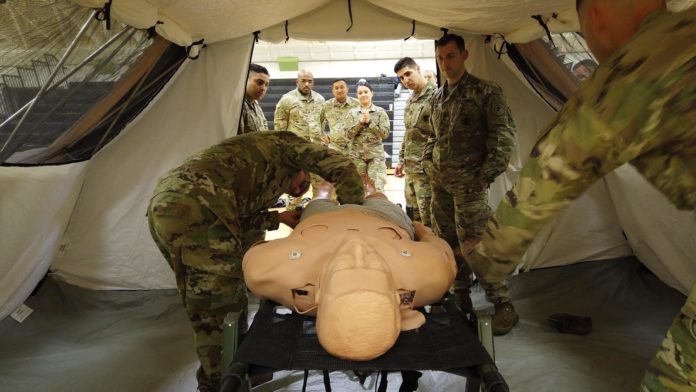
By Meredith Pratt | Staff Writer
The U.S. Army Forward Resuscitative and Surgical Teams (FRST) will be showcasing one of their mobile operating rooms at the Baylor University Pre-Health Symposium from 8 a.m. to 1:30 p.m. Saturday at the Baylor Sciences Building.
The exhibit will be hosted by the 5th Medical Recruiting Battalion and will feature experts from the Carl R. Darnall Army Medical Center and the Fort Hood Medical Simulation Training Center.
Jacqueline Graf, officer-in-charge of the Dallas Recruiting Station for U.S. Army Healthcare, said she hopes Baylor students can explore the educational and career opportunities that are available in the U.S. Army Medical Department after visiting the exhibit.
“Army medicine is agile, adaptive, flexible and responsive. Having the opportunity to showcase this and teach others what we do is a great experience,” Graf said. “The Army professionals and recruiters will demonstrate live tourniquet applications and other medical techniques that the Army utilizes to save lives on the battlefield.”
“The procedures they employ are vital to the success of contingency operations and global humanitarian missions and ensure trauma patients receive the care they need,” Graf said. “The Army today maintains over a 90% survival rate for wounded soldiers, compared to a 76% survival rate during the Vietnam War, largely due to changes in the immediate life-saving care and emergency transportation of the wounded.”
There are currently 16 FRSTs, four of which are U.S. Army airborne qualified. The teams are typically made up of 20 members, including Army surgeons, critical care nurses, CRNAs, combat medics and administrative personnel. The teams can be split into separate 10-person teams when needed.
“FRSTs are modular and scalable, offering the Army greater mission flexibility,” Lt. Col. Brian Cooley, commander of the 745th FRST, said in an article about the recent transition of many Forward Surgical Teams to Forward Resuscitative and Surgical Teams.
Each FRST has the ability to set up two operating rooms. A six-bed emergency room and eight-bed recovery room can be deployed anywhere in the world in one to two days. Their mobile operating rooms have supplies that can last for up to 72 hours.
“FRSTs demonstrate how the Army continues to evolve with the expeditionary battlefield by caring for casualties closer to the point of injury,” Lt. Col. Mary I. Rivera, commander of the 5th Medical Recruiting Battalion said. “This is just one example of how the Army continues to enhance our ability to fight and win our nation’s wars.”



